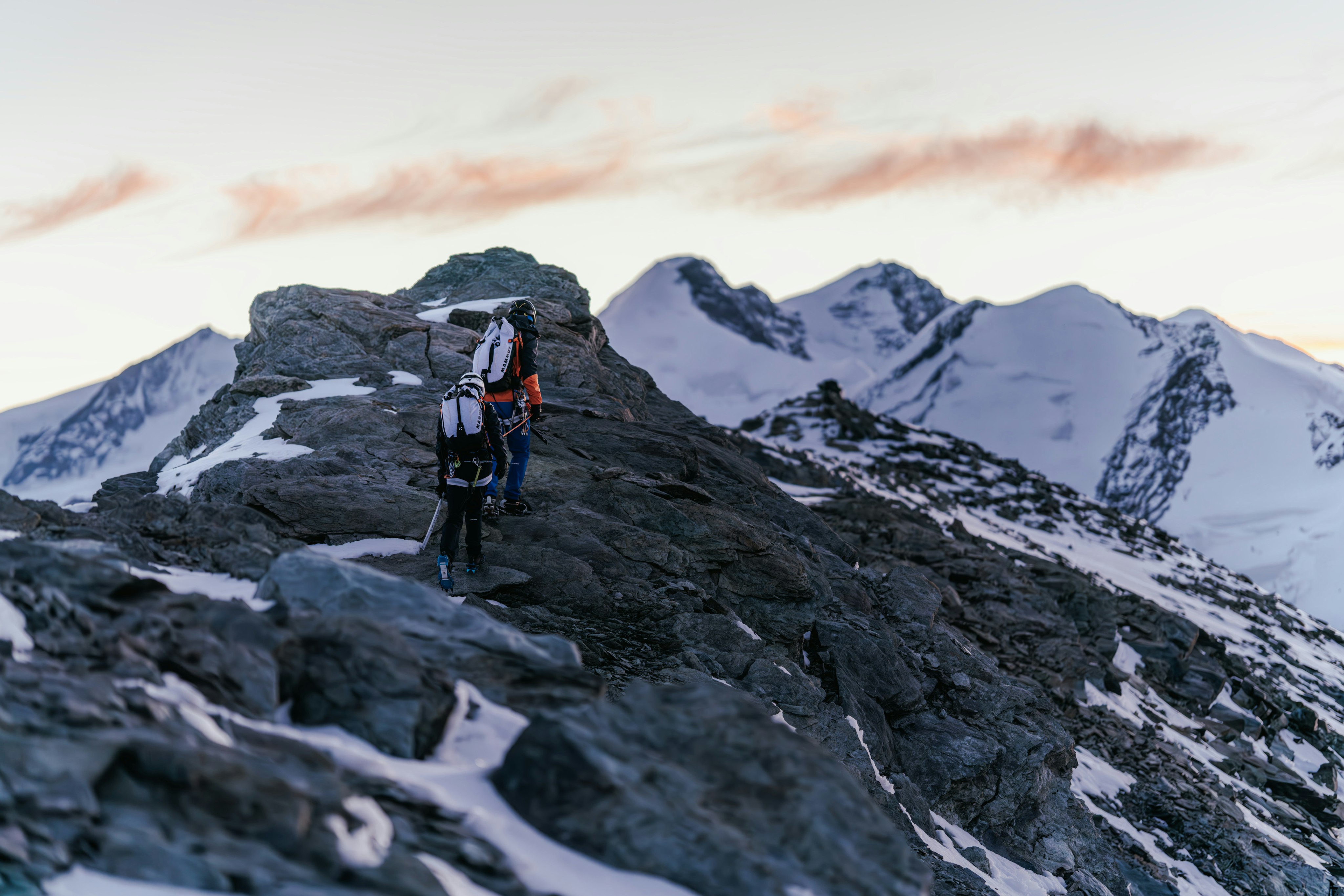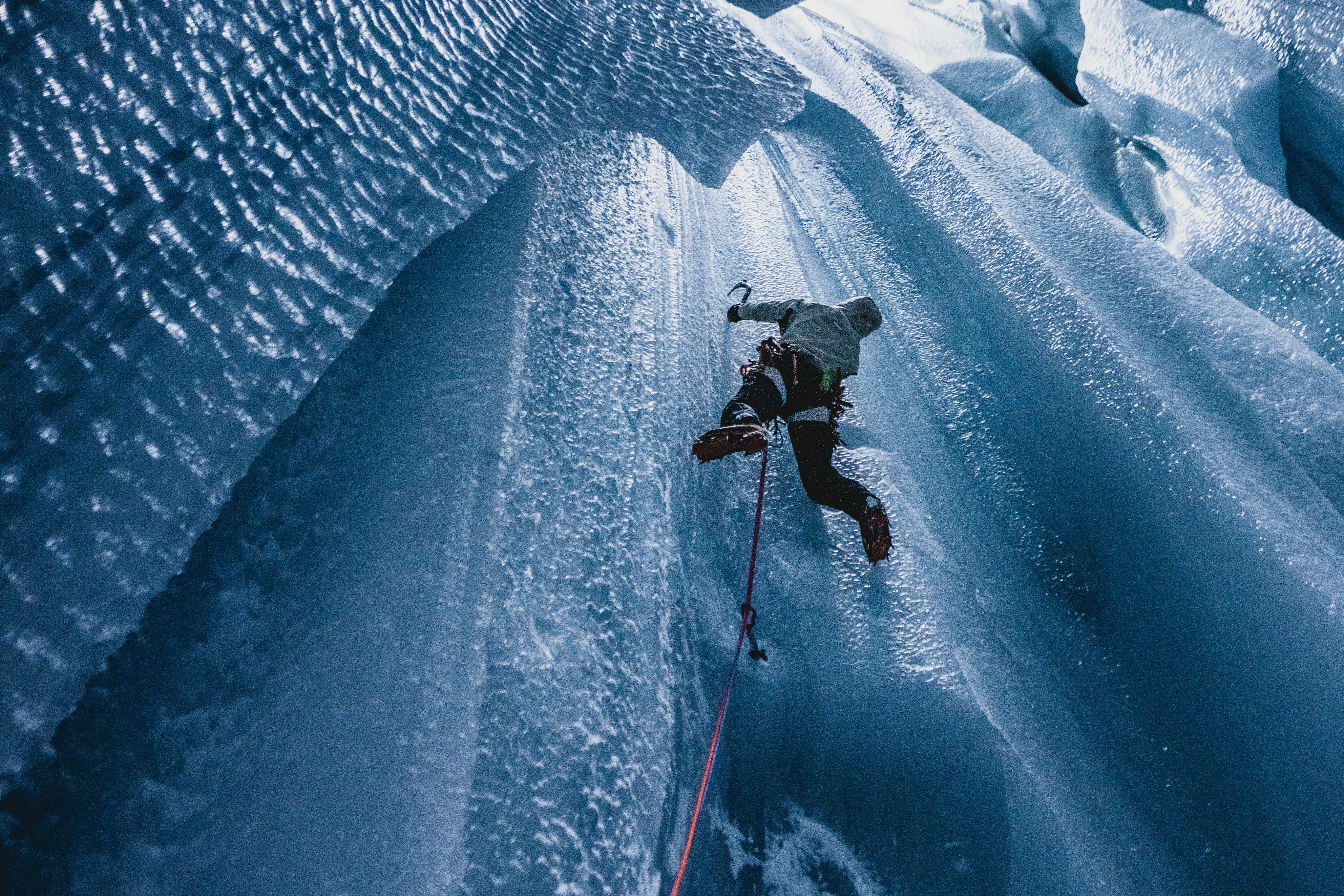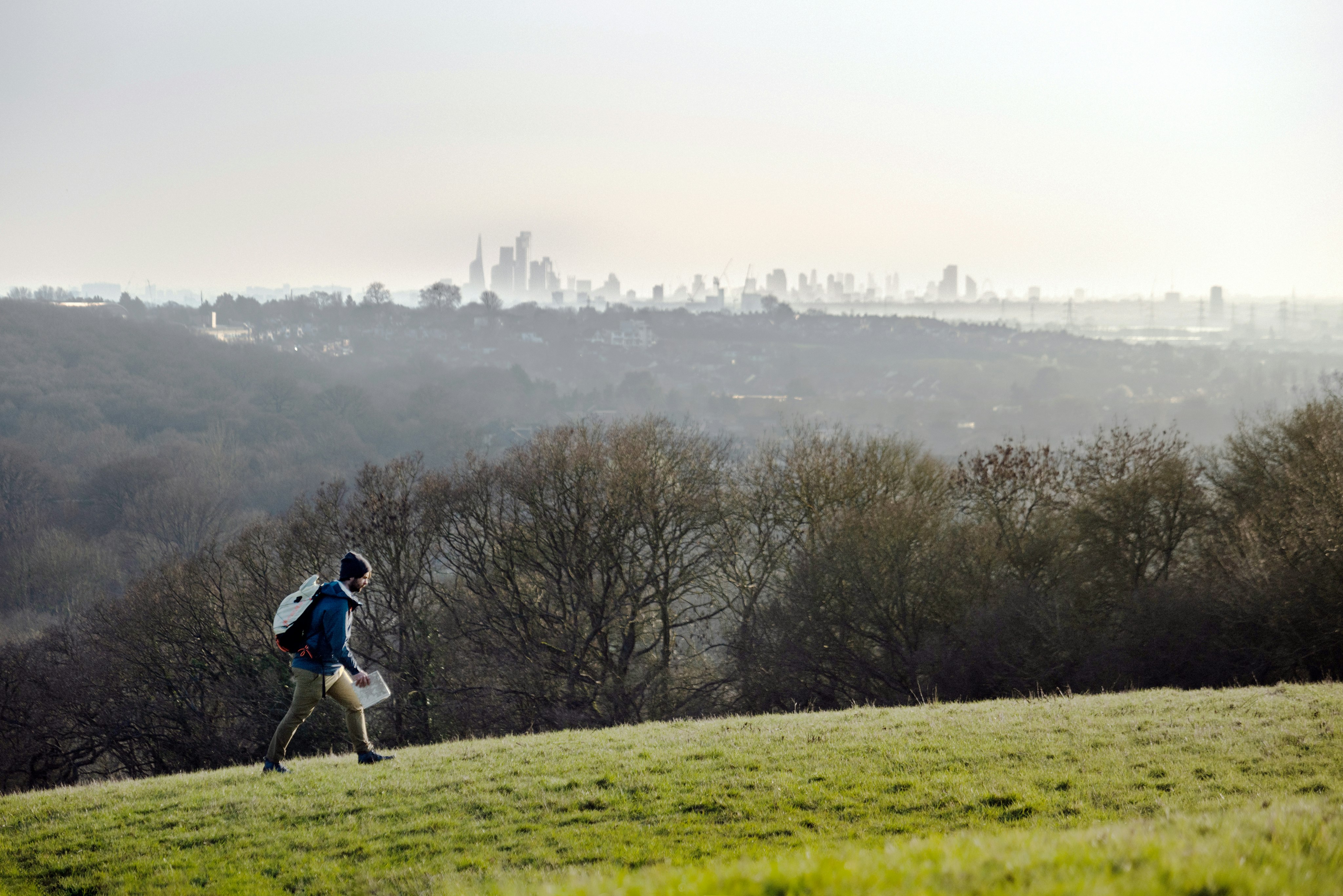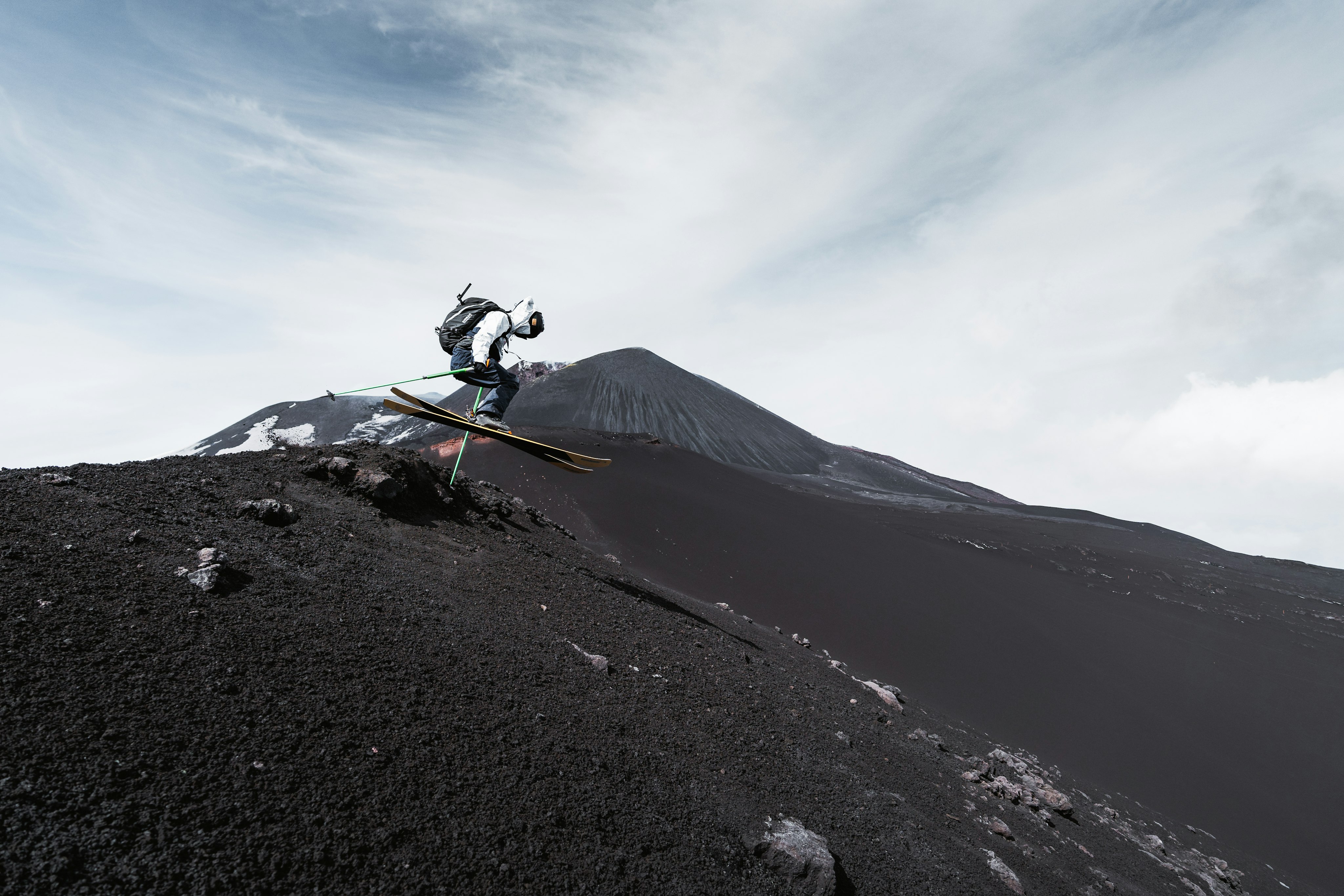An Interview with Mountaineer Olivia Jane Wood
04/2021
04/2021
On July the 22nd, 1871, Lucy Walker became the first woman to reach the summit of the Matterhorn. Climbing firmly against the grain, Lucy was undeterred by the stiff Victorian attitude of the day—and at a time when a woman’s place was still seen as firmly in the home, she made it to the top of the 4,478 metre peak in style, fuelled by a diet of champagne and sponge cake.
In 2021 — 150 years later — British mountaineer Olivia Jane Wood is set to pay homage to Lucy’s pioneering expedition, following in Lucy’s footsteps (and footholds) to summit Switzerland’s most notorious peak.
As an accomplished climber, who grew up in Zermatt—just a stone’s throw from the Matterhorn—this is far from being ‘just another mountain’ to Olivia, and reaching the top will be the realisation of a life-long dream. In partnership with Mammut and Switzerland Tourism, Olivia will be documenting every step of her journey on her Instagram account —but to set the scene a little bit, we called her up to find out a bit about her childhood in Switzerland, her love of the outdoors and the endless hunt for adrenaline...
Growing up, you spent a lot of time in Zermatt didn’t you? Was climbing the Matterhorn something you’d always wanted to do?
My family had a photography shop in the centre of Zermatt, so I spent most of my childhood out there. I’d fly out there on my own, even when I was seven years old. I’d literally wake up to the Matterhorn every morning. It was a big part of my family’s life. Me and my grandad would do these local walks, up to this viewpoint to the Matterhorn, and I remember standing with my grandparent’s one day saying, “I’m going to climb up there one day.” The Matterhorn is super special to me. It’s the one I’ve always wanted to do. To me, it’s the most iconic mountain, and it was always the one that I wanted to climb.
Even back then, were you obsessed with the outdoors?
Yeah, I guess I was. I’d literally throw myself into anything, and maybe that was because I was surrounded by these big mountains growing up. As a kid, I’d just play in the mountains, or go down to the river, and I’d never feel scared.
I'm going to climb up there one day.
Your family had St Bernards too didn’t they? They’re a classic part of mountain life in Switzerland.
We had five St Bernards. They did play a part in mountain rescue, with the local guides, but they were mainly used for my parents’ photography business. They would be taken up to a viewpoint, and then the tourists would get photographed with the St Bernards, as they were such an iconic part of the landscape. They’re the main thing everyone knows about Zermatt.
And they were traditionally for mountain rescue, weren’t they?
Yeah, they were search and rescue dogs, used to find casualties in the snow. I went deep into the history of them, and from what I read, there’s a pass that runs from Switzerland to Italy, called the Great St Bernard Pass, which was really dangerous—not only because it was high up in the mountains, but because of attacks from invaders. In the end a mountain hut was built on the pass, and dogs, which were later known as St Bernards, were kept there which would try and rescue injured people in the area. And it all kind of stemmed from that. It’s pretty fascinating if you read into it.
Were there any female climbers you looked up to when you were growing up?
There were a lot of female climbers in magazines and on the television when I was growing up, but I specifically remember watching a documentary about five years ago with Gwen Moffat in it and she really inspired me.
Back when Lucy Walker climbed the Matterhorn 150 years ago, it was seen as controversial for her to be climbing up there. What are the attitudes to female climbers these days?
I feel it’s a lot more the norm now for female mountaineers and climbers to scale big mountains. I believe females have the same capabilities as males in the mountains—and females bring a great vibe to mountaineering and climbing in this century.
I don't know if words can describe it. It makes me speechless every time I get out there.
When did you go from just knocking around the outdoors as a kid, to thinking, “Right, this is what I want to do.”
I climbed a lot when I was a kid with my grandfather. He’d take me up to the Lake District all the time. I never did any 4,000 metre peaks as a kid in Zermatt, I did plenty of hiking and rock climbing. But then in university, I joined the mountaineering and climbing club, and that’s where it all really started.
We did winter skills courses in the Cairngorms… we went rock climbing… we did indoor climbing. That’s when I started to take things more seriously, and started to push my boundaries. I’d always been into walking and scrambling, but in terms of really big stuff, university was the game changer—doing the big routes up in Scotland. Some of the guys in the club were pros, they were insane climbers—so I was doing stuff that was completely out of my comfort zone, but it quickly built my confidence.
From there, I started trying to tag along with friends who were a lot better than me. In terms of climbing I was a novice back then. I’d watch them and how they’d climb, trying to learn the rope skills. And it just progressed from there, going out to Chamonix, doing some big Alpine routes. And doing all that just built up my confidence. My first big Alpine route was about five years ago, and I completely fell in love with it, because it was so dangerous.
How does something like that differ from a day in the Lakes?
The risk is just… I don’t know… maybe ten times more than something like taking a walk up Scafell? I don’t know if words can describe it. It makes me speechless every time I get out there. Those routes out in Chamonix or the Dolomites… they’re big. It’s out of this world.
It’s a different scale. Getting to the top of the Matterhorn isn’t just a casual walk, and the last 4,000 feet is one long climb. How do you train for something like that? What are the sort of things you’ve got to think about?
I’ve got to make myself fit enough to give myself the best chance to summit. It’s a lot easier to train with a goal. I’ll be prioritising mountain fitness and efficient movement skills. I’ll try to mimic the same sort of rock movement—practicing on grade 2 or 3 scrambles, and Vdiff climbs, but carrying a rucksack and wearing mountaineering boots, whereas normally on something like that, you’d wear climbing shoes. I want to get used to moving on these climbs with a pack on my back—because it can be quite awkward.
So you’re almost simulating the situation?
Yeah, exactly. And then I’ll do strength training and loads of cardio-vascular training, to help with the altitude—plenty of big, long days on the hills.
How does the altitude affect things?
It affects each individual differently. When I was in Nepal, there was a guy who was with us who started showing signs of pulmonary edema, which is where fluid starts to build up in the lungs, at around 4,800 metres. That’s one of the biggest problems, and it can actually kill you if it’s not treated correctly. And then there’s headaches and being out of breath—so that makes everything a lot harder. So the fitter I am, the better. But in terms of the Matterhorn, you’re not that high—I think my altitude sickness hit me around 5,200 metres, and I just got headaches and felt a little bit woozy.
There’s a lot you’ve got to think about then. I suppose there are a lot of variables with climbing—it’s not like you’re running a hundred metres on a track, or swimming in a swimming pool.
It’s funny you say that. When you’re climbing a mountain, you don’t have opponents like with other sports. I think with traditional sports, you’re constantly training to beat somebody else—being faster, or stronger than them. But climbing just isn’t like that. You’re putting in all the same effort, but it’s usually to join up with someone to do something you wouldn’t normally be capable of. It’s not normal. I think that’s what attracts me so much to it.
Some people might be competitive with it, but it doesn’t seem like that’s what it’s about for you. Is it more about pushing yourself?
Yeah. But I definitely know the risks now. Even though these experiences build your confidence, you can’t be overconfident. I used to always think, “Okay, we’re at the top now, it’s so easy to get down.” But it’s not—going down is the most dangerous part.
I can imagine you could get quite cocky with stuff like this—but maybe that’s where people go wrong.
100%. You can’t overthink things, as sometimes overthinking things can cause the problem—but you’ve got to know your vulnerabilities and the ‘what ifs’. That’ll definitely save you.
These huge mountains are pretty serious. You can’t take them lightly.
You just don’t know what’s going to happen. But I think the human mind, or at least my mind, needs these adventures. I need to take these risks. It just makes sense to me. We live in a society of performance, where it’s cool to push boundaries and limits—and that’s what I love about adventures—climbing a mountain like the Matterhorn is another way to push my boundaries.
How do you deal mentally with something like that? It must get pretty daunting at points.
There’s only one way up, and one way down, so I just try and stay very focussed, and very calm. I don’t overthink too much. Being a little bit scared is healthy, but not to the point where you freeze up. I try to just enjoy it.
It's the adrenaline. That's what I crave in my life.
Is it a case of getting into that ‘flow state’ type thing—just doing things naturally?
Yeah, you don’t want to think about it. I know the risks are there, but I don’t think about them.
Do you have a favourite place in the UK you like to climb?
In winter it’d be in Scotland. I’ve not done loads of winter stuff up there, but that’s the place to build confidence in winter mountaineering stuff. But then there’s the Lakes. I love the Langdales for climbing—there’s some beautiful crags there to climb on a nice sunny evening. I love Wales too, but I’ve not been able to enjoy it as much. There’s some beautiful climbs there.
And what about in Europe?
I always go back to Zermatt, because it’s like a second home to me. It’s so safe—no cars are allowed there, there are just little electric taxis. And then on Sunday, you’re not allowed to do any gardening or any washing—and if you do, you get fined. It’s amazing. And the peach ice tea is to die for. And then there’s Italy as well. The Gran Paradiso is a beautiful national park. It’s still alpine, but there’s no technical climbing in it.
Where’s the buzz of all this for you? Is it when you get back from a big adventure? Or is it when you’re out there?
There is that feeling at the end—I usually get a bit shell shocked, and I need a bit of time to get my head around what I’ve just done—but for me, it’s doing it. It’s the adrenaline. That’s what I crave in my life.
How far do you take that though? Are there things you wouldn’t do?
I’m petrified of flying—but I still do it. One of my goals in life was to get rid of that fear, so I thought by doing that I’d do my AFF licence, which is for skydiving. So I’m in the process of that now, and I can jump out of the planes on my own now. I’m still scared, but it’s eliminated a lot of my fear, because skydiving planes are the worst planes to fly in—they’re just rickety little things. And I can’t even explain the feeling of falling out of an aeroplane, and then pulling your parachute. It’s such a cool feeling when you’ve launched your parachute and you’re flying through the air.
Yeah that bit sounds okay, but you’ve got to do the ‘falling out the plane’ bit to get to that.
Yeah, it’s weird. Thinking about it actually scares me. I can’t really explain what it’s like. Maybe go in a wind-tunnel and try that, because it’s a similar feeling. It’s not the sort of thing the human body is made for. It’s so not normal for a human body to jump out of an aeroplane, 15,000 feet up in the air.
How do you then relax from all this?
I don’t. I guess I do relax in my own time, but I’m always thinking about what my next adventure is. That’s what keeps me alive. It keeps me going. It’s like my grandma—she’s 80 and she’s still walking in the hills. I always say to her, “How are you still going?” and she says, “It’s because I’m not sat there doing nothing.”
Having something to get out of bed for is important—is that what keeps you doing so many different things? As well as climbing, you also do a lot of mountain-biking and snowboarding.
Yeah—it’s like with mountain biking. I started that four years ago. I was okay at it, which meant I wanted to get better at it. And now it’s just another thing in my life. My favourite thing is hike-a-bike—hiking up mountains with my bike—and that helps me with my fitness as carrying a bike up a mountain is ten times harder than carrying a rucksack. Everything fits together.
And then there’s paddle-boarding and snowboarding. I just embrace all adventure I guess. I’m definitely not one of those people who are good at everything, I just don’t give up. I keep trying until I get better. I’m not naturally good at everything, but I always want to learn.
That’s a good way to be. We’ve talked for a while now—have you got any wise words to finish this with?
If I can do it, anybody can. They’re my words of wisdom.
This summer Olivia will be making her first ascent of the Matterhorn, 150 years to the day that Lucy Walker became the first woman to climb the mountain. To keep up with her training schedule and to see what it takes to complete this kind of climb follow @olivia.jane.x , @mammut_uk , @zermatters , @myswitzerland , and the #lucywalker150 hashtag on Instagram for updates.
Explore Mammut Technologies
We are inventors, developers and pioneers. We take big, exciting ideas and turn them into reality, pushing quality and performance up to a whole new level. And we’ve been doing it since 1862. Find out more about our latest technologies.



